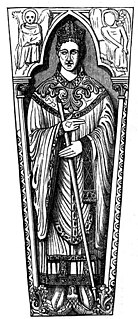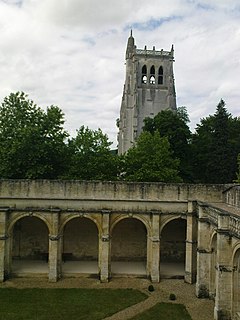Related Research Articles
Athelm was an English churchman, who was the first Bishop of Wells, and later Archbishop of Canterbury. His translation, or moving from one bishopric to another, was a precedent for later translations of ecclesiastics, because prior to this time period such movements were considered illegal. While archbishop, Athelm crowned King Æthelstan, and perhaps wrote the coronation service for the event. An older relative of Dunstan, a later Archbishop of Canterbury, Athelm helped promote Dunstan's early career. After Athelm's death, he was considered a saint.
William Courtenay was Archbishop of Canterbury (1381–1396), having previously been Bishop of Hereford and Bishop of London.
Geoffrey Ridel was the nineteenth Lord Chancellor of England, from 1162 to 1173.
Eustace was the twenty-third Lord Chancellor of England, from 1197 to 1198. He was also Dean of Salisbury and Bishop of Ely.
Nothhelm was a medieval Anglo-Saxon Archbishop of Canterbury. A correspondent of both Bede and Boniface, it was Nothhelm who gathered materials from Canterbury for Bede's historical works. After his appointment to the archbishopric in 735, he attended to ecclesiastical matters, including holding church councils. Although later antiquaries felt that Nothhelm was the author of a number of works, later research has shown them to be authored by others. After his death he was considered a saint.
Philip of Poitou was Bishop of Durham from 1197 to 1208, and prior to this Archdeacon of Canterbury.
Jænberht was a medieval monk, and later the abbot, of St Augustine's Abbey, Canterbury who was named Archbishop of Canterbury in 765. As archbishop, he had a difficult relationship with King Offa of Mercia, who at one point confiscated lands from the archbishopric. By 787, some of the bishoprics under Canterbury's supervision were transferred to the control of the newly created Archbishopric of Lichfield, although it is not clear if Jænberht ever recognised its legitimacy. Besides the issue with Lichfield, Jænberht also presided over church councils in England. He died in 792 and was considered a saint after his death.

Æthelhard was a Bishop of Winchester then an Archbishop of Canterbury in medieval England. Appointed by King Offa of Mercia, Æthelhard had difficulties with both the Kentish monarchs and with a rival archiepiscopate in southern England, and was deposed around 796 by King Eadberht III Præn of Kent. By 803, Æthelhard, along with the Mercian King Coenwulf, had secured the demotion of the rival archbishopric, once more making Canterbury the only archbishopric south of the Humber in Britain. Æthelhard died in 805, and was considered a saint until his cult was suppressed after the Norman Conquest in 1066.

Lawrence Booth served as Prince-Bishop of Durham and Lord Chancellor of England, before being appointed Archbishop of York.

Simon of Apulia was an Italian-born canon lawyer who served as Bishop of Exeter in Devon, England, from 1214 until his death in 1223.
Simon Langton was an English medieval clergyman who served as Archdeacon of Canterbury from 1227 until his death in 1248. He had previously been Archbishop-elect of York, but the election was quashed by Pope Innocent III.
Leofwin was a medieval Bishop of Lichfield.
Richard Peche was a medieval Bishop of Lichfield.

Hugh Nonant was a medieval Bishop of Coventry in England. A great-nephew and nephew of two Bishops of Lisieux, he held the office of archdeacon in that diocese before serving successively Thomas Becket, the Archbishop of Canterbury and King Henry II of England. Diplomatic successes earned him the nomination to Coventry, but diplomatic missions after his elevation led to a long delay before he was consecrated. After King Henry's death, Nonant served Henry's son, King Richard I, who rewarded him with the office of sheriff in three counties. Nonant replaced his monastic cathedral chapter with secular clergy, and attempted to persuade his fellow bishops to do the same, but was unsuccessful. When King Richard was captured and held for ransom, Nonant supported Prince John's efforts to seize power in England, but had to purchase Richard's favour when the king returned.
William de Cornhill was a medieval Bishop of Coventry.
Alexander de Stavenby was a medieval Bishop of Coventry and Lichfield.
Henry Marshal was a medieval Bishop of Exeter.
Geoffrey de Clive was a medieval Bishop of Hereford.
Ralph of Maidstone was a medieval Bishop of Hereford.
References
- Franklin, M. J. (2004). "Muschamp, Geoffrey de". Oxford Dictionary of National Biography (online ed.). Oxford University Press. doi:10.1093/ref:odnb/10534.(Subscription or UK public library membership required.)
- Fryde, E. B.; Greenway, D. E.; Porter, S.; Roy, I. (1996). Handbook of British Chronology (Third revised ed.). Cambridge, UK: Cambridge University Press. ISBN 0-521-56350-X.